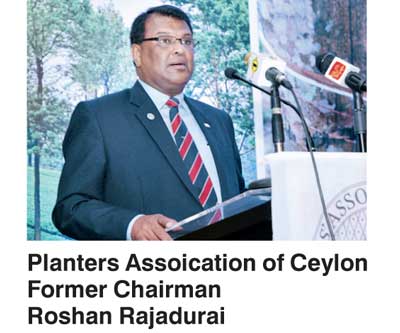Tuesday Feb 17, 2026
Tuesday Feb 17, 2026
Monday, 19 September 2016 00:49 - - {{hitsCtrl.values.hits}}
 The plantation industry is in dire straits as it continues its downward spiral that started from early 2014 onwards, industry leaders warned, with tea production declining by 2.7% and tea export earnings dropping by 14.3% in 2015 compared to the previous year.
The plantation industry is in dire straits as it continues its downward spiral that started from early 2014 onwards, industry leaders warned, with tea production declining by 2.7% and tea export earnings dropping by 14.3% in 2015 compared to the previous year.
Rubber too has had a lacklustre year with export earnings recording a significant decrease of 40% from Rs. 5.9 billion to Rs. 3.5 billion.
“The foremost challenge our industry faced last year was the drop in tea and rubber prices. Since 95% of our tea is exported, we are totally dependent on global price trends for our auction prices. In January 2014, the National Sale Average per kilo of tea at the Colombo Auctions was Rs. 510. This dropped to Rs. 402 by December 2015 – a drop of 20%,” said Ceylon Planters’ Association former Chairman Roshan Rajadurai.
The steep drop in prices compelled the Government to subsidise tea small holder producers by setting a price of Rs. 80 per kg of green leaf and Rs. 350 per kg of RSS for rubber. According to Rajadurai, RPCs were not eligible for this subsidy.
“The revenue top line loss for RPCs from the tea and rubber price drop, beyond the control of the producer, was Rs. 9.3 billion. The Government’s decision to withdraw the fertiliser subsidy only to the RPCs caused a further additional expenditure of Rs. 2.5 billion.”
With the weedicide ban RPCs incurred another huge additional expense. “To compound this situation even further, the illogical ban on weedicides cost the RPCs a further Rs. 2.5 billion in weeding cost alone,” he said.
Rajadurai urged the Government to have equality in the treatment of the producers. “While the RPCs have to pay all the Government leases, taxes, levies, cess and every other payment we are called upon to in the conduct of the business, when it comes to assistance and concessions given to the industry, we are conveniently left out,” he said. “We cannot understand the logic of differential and discriminatory treatment meted out to RPCs.”
“Since privatisation in 1992, labour wages have increased 13-fold, although tea prices have increased only six-fold in the same period. In the past significant wage increases have been granted including 36% in 2004, 27% in 2006, 40% in 2009, 28% in 2011 and 20% in 2013. The RPCs challenge whether any other industry of similar size, scale, significance and background has given a 13-fold increase in 20 years although the industry had been in a downward spiral for the last 10 years.”
From 2013 onwards RPCs have been advocating the productivity-based wage model rather than the archaic attendance-based wage model to boost production levels.
Rajadurai also lamented the weak work ethic among the estate population as a grave concern. “Their comparative earnings have increased substantially but the critical issue is in the household cash management in the plantation sector and the entitlement mindset and the dependent syndrome of estate sector workers.”
The Ceylon Planters’ Association which represents the Regional Plantation Companies (RPCs) contributes 52.58% of the total tea production and 30.04% of total rubber production in the country.